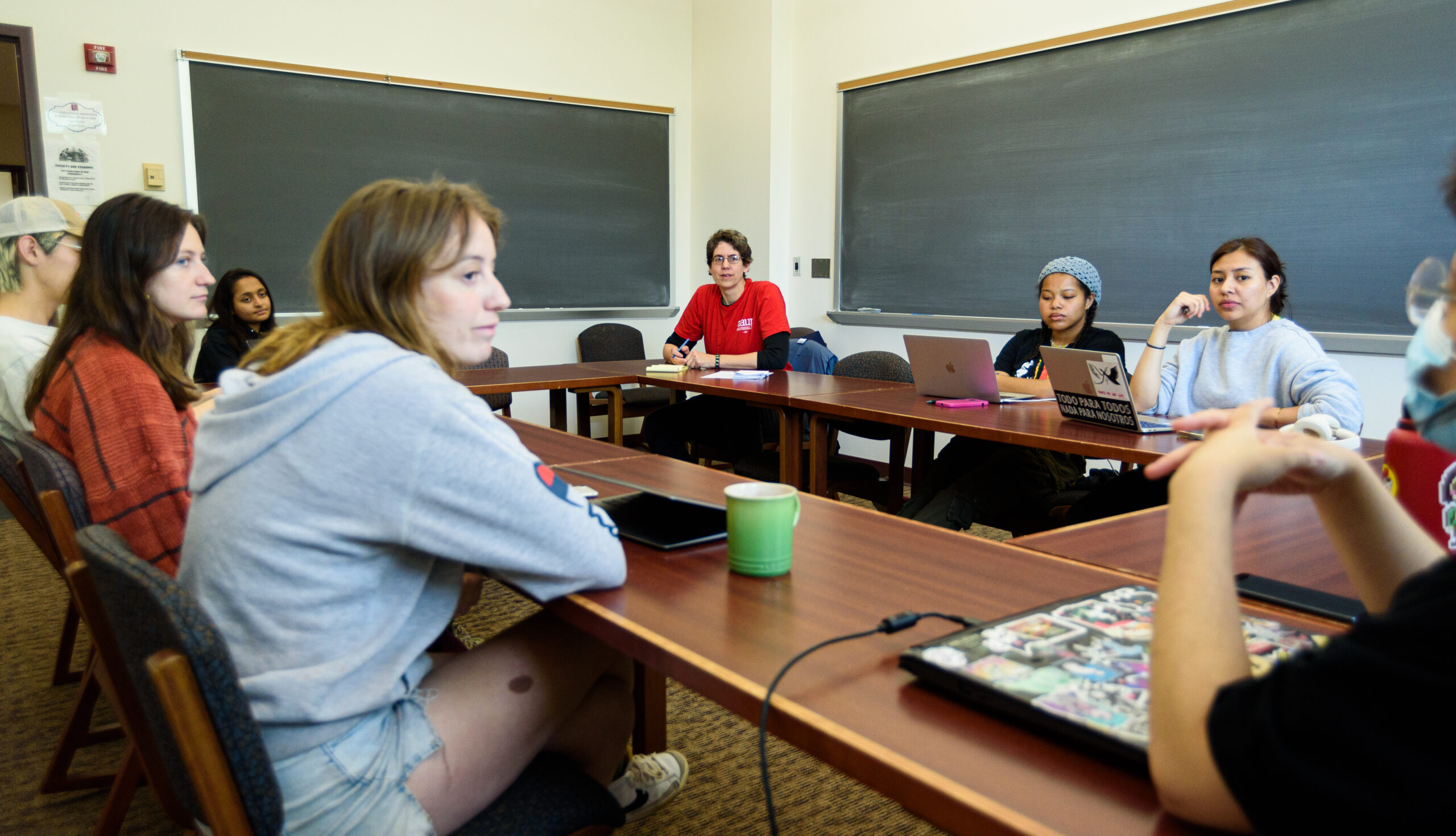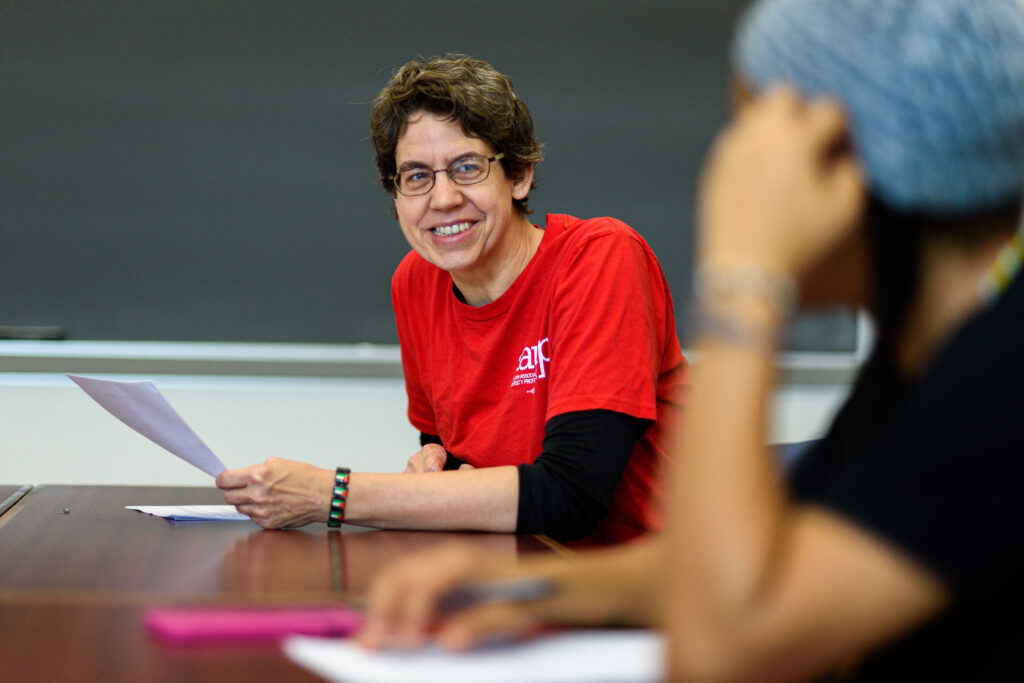
For 50 years, Earlham’s Peace & Global Studies program has trained students to become resilient in the fight for justice.
It’s a standard trope: a college student, starry-eyed and idealistic, graduates into the “real world” only to have their dreams crushed — by corporate greed, or family expectations, or a society that just doesn’t make room for their vision of the future.
Like many college students, Earlhamites often come to campus as idealists. But 10, 20, 50 years later, many still are. How, then, have Earlhamites learned to shoulder disappointment and keep up the fight for the common good despite the setbacks?
The answer may be found in a long-standing program at the heart of Earlham’s purpose: Peace and Global Studies (PAGS).
“I put a lot of energy into trying to steel the students’ resolve, so they appreciate even at the bodily level that this is a long struggle, and they might not see the fruits of their labors in their lifetimes,” says Director Joanna Swanger ’90. “The students who take that to heart appreciate it after graduation, because they see other people give up after a year or two. But PAGS students understand what’s at play and how to continue to come back even when faced with obstacles.”

“I put a lot of energy into trying to steel the students’ resolve, so they appreciate even at the bodily level that this is a long struggle, and they might not see the fruits of their labors in their lifetimes.”
— Joanna Swanger
Earlham’s Peace and Global Studies program turns 50 this year. Founded in 1974 by the late Howard Richards and Caroline Higgins (formerly Caroline Richards), it stands as one of the pioneers of academic peace programs in the United States.
Howard and Caroline first met in California, where they found some success working with Cesar Chavez’s movement for United Farm Workers. Yet they also found that as the union made headway, the growers turned more and more to mechanization, undercutting the union’s power. The two later traveled to Chile to work with popular education efforts. There, they saw the election of the country’s first socialist leader, Salvador Allende, in 1970 — as well as the subsequent US-backed military coup that overthrew him.
Their conclusion: Organizing alone is not enough. The only way to achieve lasting change is to address the underlying, structural issues at play — and to do it in a way that doesn’t ignite an even harsher backlash.
When Howard and Caroline were approached to establish a peace studies program at Earlham in 1974, these experiences laid the foundation for how they would structure the curriculum. Originally called Peace and Conflict Studies, the program focuses first and foremost on questions of justice and analyzing violence in all its forms: from war and militarism to colonialism, institutionalized racism, and gender-based and economic violence.
Over the years, faculty from across the Earlham curriculum have contributed to this program—including Tony Bing, John Ray, George Lopez, Welling Hall, Dan Rosenberg, Jonathan Diskin, Carol Hunter, Chris Swafford, Gray Cox, Nigel Young, Pat Washburn, Mervyn Love, and Chuck Yates. More recently, some of the primary faculty contributors to the PAGS program have included Peter Carlo Becerra, Ferit Güven, Ahmed Khanani, Victor Kumar, JoAnn Martin, Ryan Murphy and Womai Song.
Swanger, the current director of PAGS, is also a graduate of the program. When she was a student in the 1980s, she noted how the program flexed to encompass and address major world issues and the current campus climate—including, at that time, the nuclear arms race, apartheid, U.S.-backed wars in Latin America, the Intifada in Palestine, and unrest in Northern Ireland. Student groups, such as the Apartheid Action Coalition and the Committee in Solidarity with Latin America, and Earlham faculty-led programs to Jerusalem and Northern Ireland allowed students to engage with pressing world issues in real ways.
The proof of the program’s success is in its graduates. Andrés Conteris ’84, who also received Earlham’s sesquicentennial alumni peace award, credits PAGS for shaping his own path after Earlham—from receiving a Watson Fellowship, to supporting indigenous movements in Honduras, to becoming the founder of Democracy Now! en Español. Other PAGS alumni are Rhodes, Watson, and Fulbright fellows, and working in community and social services, education, and political organizing around the world.
“It was life-changing to be at Earlham,” Contreris said. “It helped focus a lot of my commitment to this field. I applied to Earlham because of its peace studies program, because at that time there were very few around the country.
“One thing that was crucial, for me, was that Howard Richards and Professor George Lopez encouraged me to pursue my passion around human rights because of a family situation with my uncle, who was an Amnesty International Prisoner of Conscience in Uruguay,” he said. “They prepared me to do a self-designed internship, where I traveled to D.C. and got 26 U.S. senators to sign a letter for my uncle. He was freed in 1985, the year after I graduated, and he later came to Earlham as a speaker on a tour giving thanks to all who helped apply pressure.”
Yet PAGS doesn’t offer easy solutions to world peace or social justice — a frustrating concept to many college students. What it does offer is a far more lasting and sustainable worldview for its graduates.
“We don’t want to graduate people who all think the same thing,” says Swanger. “It’s not about a fixed set of tools, or a one-size fits-all solution of how to build peace.
“Instead, PAGS is about getting students to ask better and better questions, and to bring a more sophisticated analysis to an issue, so they can go into any context and know how to form the right kinds of relationships with the people there. Because those are the people who ultimately define what constitutes justice and what could contribute to sustainable peace.”
Story by Jen Gose